Cambridge Analytica Data Collection: Ethical Implications and Analysis
VerifiedAdded on 2023/06/07
|7
|1811
|122
Essay
AI Summary
This essay examines the ethical implications of Cambridge Analytica's data collection practices, focusing on the misuse of Facebook user data. It delves into the ethical issues raised by this case, exploring the application of ethical theories such as utilitarianism, deontology, contract theory, and virtue ethics. The analysis highlights how Cambridge Analytica's actions violated user privacy and societal trust, impacting the 2016 US presidential election. The essay recommends measures to protect user data, including increased awareness, technological safeguards, and government regulations. It emphasizes the importance of ethical conduct in cyber technology and suggests actions to prevent future data breaches and promote a secure online environment. The conclusion stresses the need for legal frameworks, data security, and public awareness to mitigate the risks associated with cyber technology.
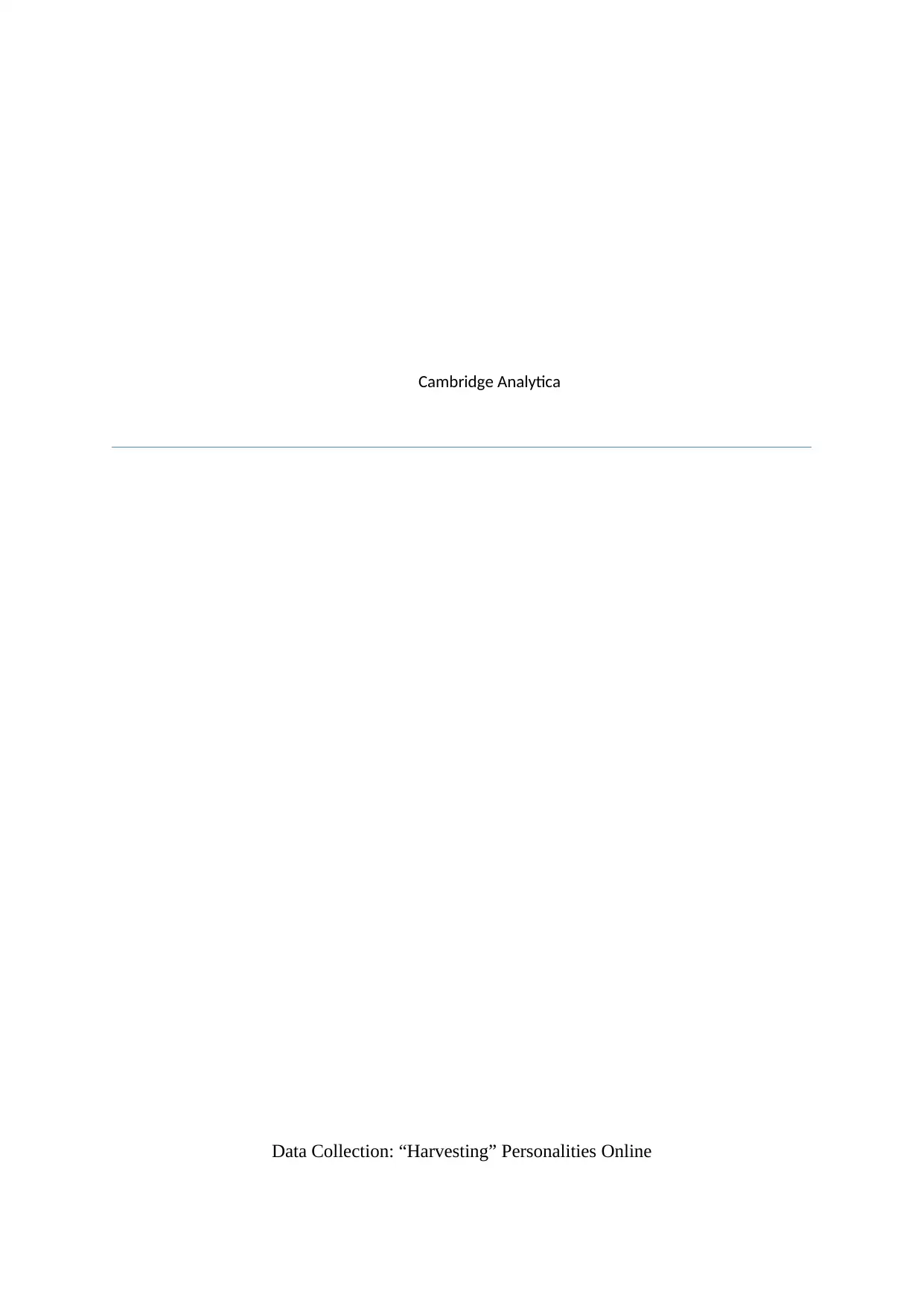
Cambridge Analytica
Data Collection: “Harvesting” Personalities Online
Data Collection: “Harvesting” Personalities Online
Paraphrase This Document
Need a fresh take? Get an instant paraphrase of this document with our AI Paraphraser
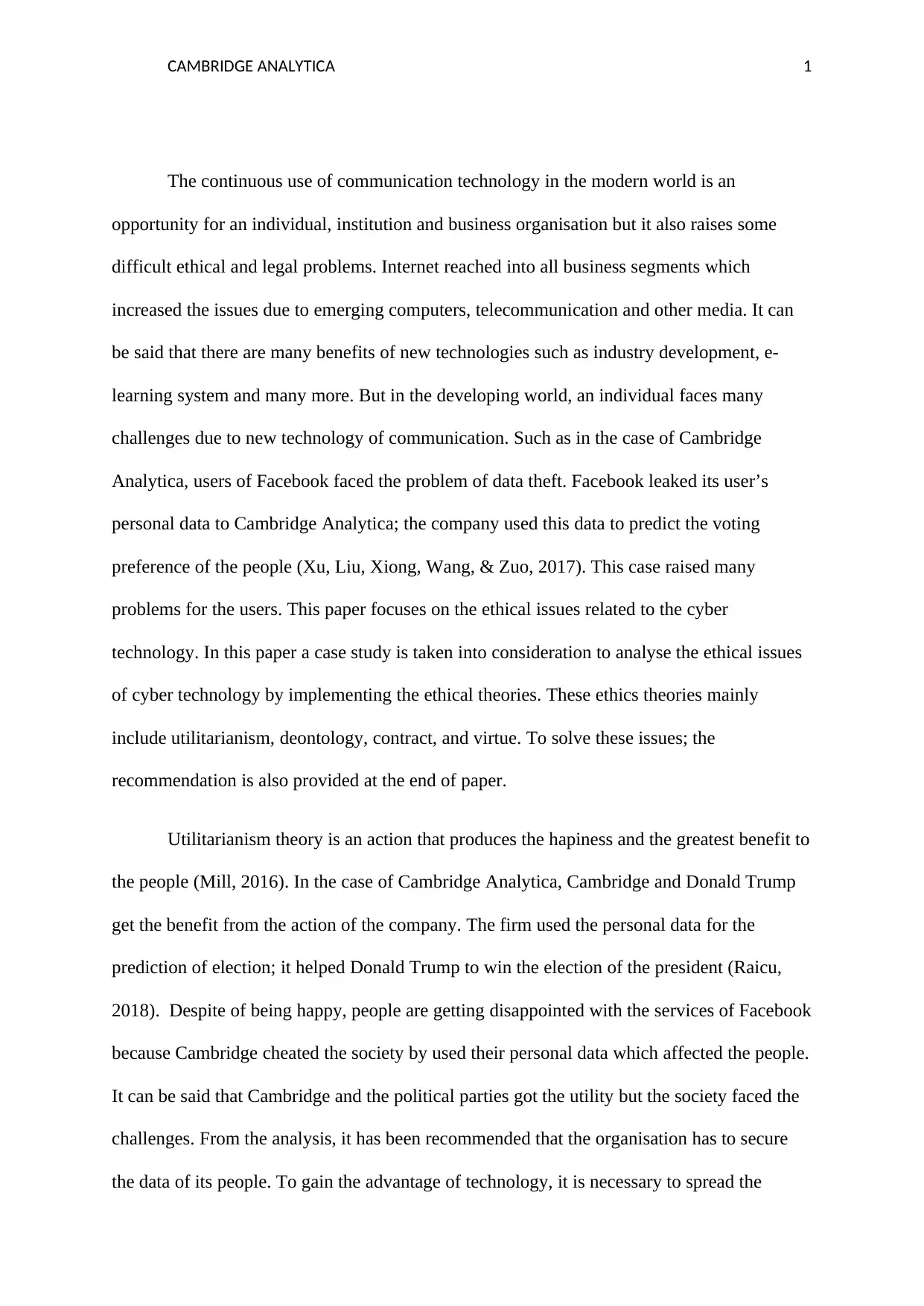
CAMBRIDGE ANALYTICA 1
The continuous use of communication technology in the modern world is an
opportunity for an individual, institution and business organisation but it also raises some
difficult ethical and legal problems. Internet reached into all business segments which
increased the issues due to emerging computers, telecommunication and other media. It can
be said that there are many benefits of new technologies such as industry development, e-
learning system and many more. But in the developing world, an individual faces many
challenges due to new technology of communication. Such as in the case of Cambridge
Analytica, users of Facebook faced the problem of data theft. Facebook leaked its user’s
personal data to Cambridge Analytica; the company used this data to predict the voting
preference of the people (Xu, Liu, Xiong, Wang, & Zuo, 2017). This case raised many
problems for the users. This paper focuses on the ethical issues related to the cyber
technology. In this paper a case study is taken into consideration to analyse the ethical issues
of cyber technology by implementing the ethical theories. These ethics theories mainly
include utilitarianism, deontology, contract, and virtue. To solve these issues; the
recommendation is also provided at the end of paper.
Utilitarianism theory is an action that produces the hapiness and the greatest benefit to
the people (Mill, 2016). In the case of Cambridge Analytica, Cambridge and Donald Trump
get the benefit from the action of the company. The firm used the personal data for the
prediction of election; it helped Donald Trump to win the election of the president (Raicu,
2018). Despite of being happy, people are getting disappointed with the services of Facebook
because Cambridge cheated the society by used their personal data which affected the people.
It can be said that Cambridge and the political parties got the utility but the society faced the
challenges. From the analysis, it has been recommended that the organisation has to secure
the data of its people. To gain the advantage of technology, it is necessary to spread the
The continuous use of communication technology in the modern world is an
opportunity for an individual, institution and business organisation but it also raises some
difficult ethical and legal problems. Internet reached into all business segments which
increased the issues due to emerging computers, telecommunication and other media. It can
be said that there are many benefits of new technologies such as industry development, e-
learning system and many more. But in the developing world, an individual faces many
challenges due to new technology of communication. Such as in the case of Cambridge
Analytica, users of Facebook faced the problem of data theft. Facebook leaked its user’s
personal data to Cambridge Analytica; the company used this data to predict the voting
preference of the people (Xu, Liu, Xiong, Wang, & Zuo, 2017). This case raised many
problems for the users. This paper focuses on the ethical issues related to the cyber
technology. In this paper a case study is taken into consideration to analyse the ethical issues
of cyber technology by implementing the ethical theories. These ethics theories mainly
include utilitarianism, deontology, contract, and virtue. To solve these issues; the
recommendation is also provided at the end of paper.
Utilitarianism theory is an action that produces the hapiness and the greatest benefit to
the people (Mill, 2016). In the case of Cambridge Analytica, Cambridge and Donald Trump
get the benefit from the action of the company. The firm used the personal data for the
prediction of election; it helped Donald Trump to win the election of the president (Raicu,
2018). Despite of being happy, people are getting disappointed with the services of Facebook
because Cambridge cheated the society by used their personal data which affected the people.
It can be said that Cambridge and the political parties got the utility but the society faced the
challenges. From the analysis, it has been recommended that the organisation has to secure
the data of its people. To gain the advantage of technology, it is necessary to spread the
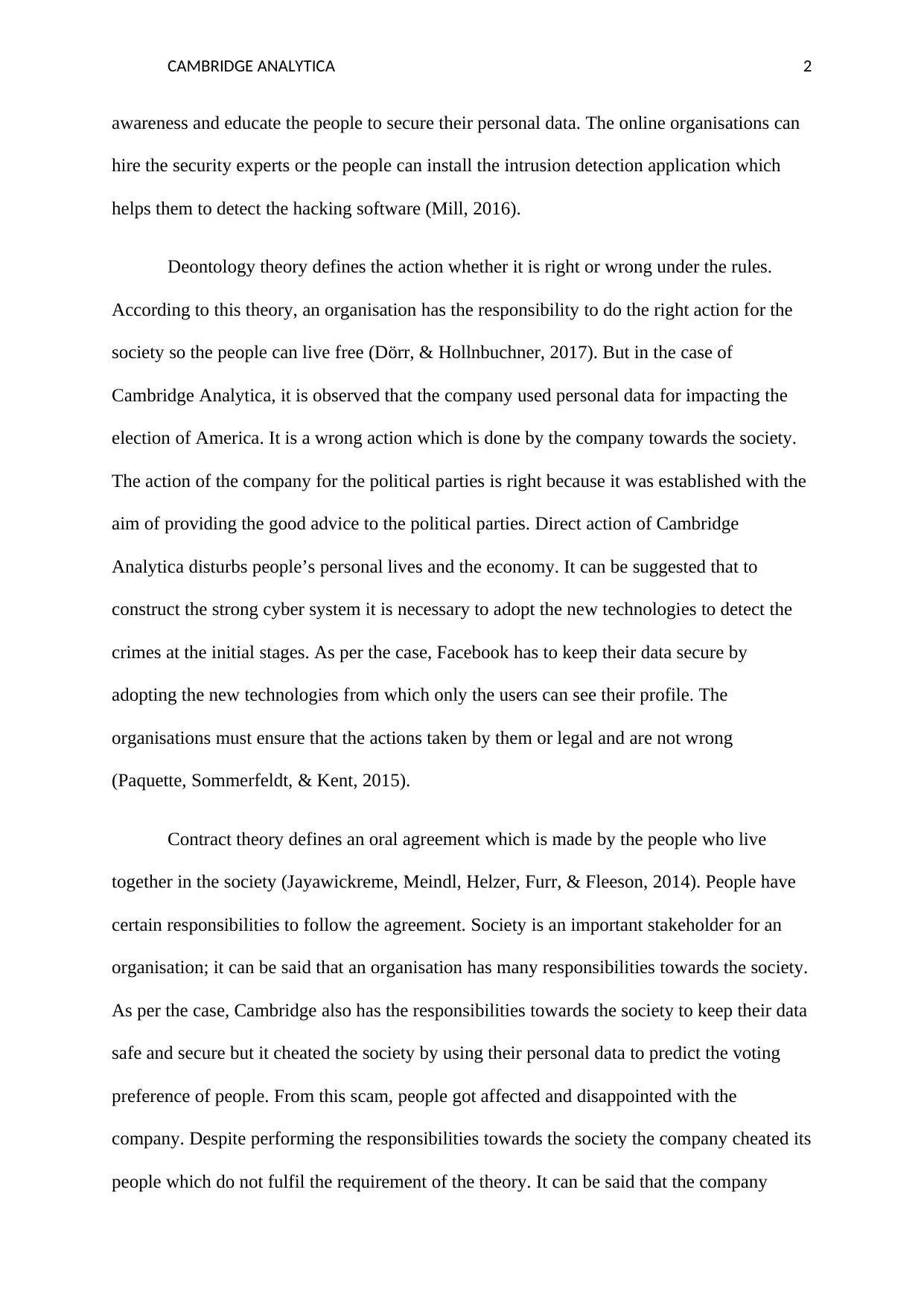
CAMBRIDGE ANALYTICA 2
awareness and educate the people to secure their personal data. The online organisations can
hire the security experts or the people can install the intrusion detection application which
helps them to detect the hacking software (Mill, 2016).
Deontology theory defines the action whether it is right or wrong under the rules.
According to this theory, an organisation has the responsibility to do the right action for the
society so the people can live free (Dörr, & Hollnbuchner, 2017). But in the case of
Cambridge Analytica, it is observed that the company used personal data for impacting the
election of America. It is a wrong action which is done by the company towards the society.
The action of the company for the political parties is right because it was established with the
aim of providing the good advice to the political parties. Direct action of Cambridge
Analytica disturbs people’s personal lives and the economy. It can be suggested that to
construct the strong cyber system it is necessary to adopt the new technologies to detect the
crimes at the initial stages. As per the case, Facebook has to keep their data secure by
adopting the new technologies from which only the users can see their profile. The
organisations must ensure that the actions taken by them or legal and are not wrong
(Paquette, Sommerfeldt, & Kent, 2015).
Contract theory defines an oral agreement which is made by the people who live
together in the society (Jayawickreme, Meindl, Helzer, Furr, & Fleeson, 2014). People have
certain responsibilities to follow the agreement. Society is an important stakeholder for an
organisation; it can be said that an organisation has many responsibilities towards the society.
As per the case, Cambridge also has the responsibilities towards the society to keep their data
safe and secure but it cheated the society by using their personal data to predict the voting
preference of people. From this scam, people got affected and disappointed with the
company. Despite performing the responsibilities towards the society the company cheated its
people which do not fulfil the requirement of the theory. It can be said that the company
awareness and educate the people to secure their personal data. The online organisations can
hire the security experts or the people can install the intrusion detection application which
helps them to detect the hacking software (Mill, 2016).
Deontology theory defines the action whether it is right or wrong under the rules.
According to this theory, an organisation has the responsibility to do the right action for the
society so the people can live free (Dörr, & Hollnbuchner, 2017). But in the case of
Cambridge Analytica, it is observed that the company used personal data for impacting the
election of America. It is a wrong action which is done by the company towards the society.
The action of the company for the political parties is right because it was established with the
aim of providing the good advice to the political parties. Direct action of Cambridge
Analytica disturbs people’s personal lives and the economy. It can be suggested that to
construct the strong cyber system it is necessary to adopt the new technologies to detect the
crimes at the initial stages. As per the case, Facebook has to keep their data secure by
adopting the new technologies from which only the users can see their profile. The
organisations must ensure that the actions taken by them or legal and are not wrong
(Paquette, Sommerfeldt, & Kent, 2015).
Contract theory defines an oral agreement which is made by the people who live
together in the society (Jayawickreme, Meindl, Helzer, Furr, & Fleeson, 2014). People have
certain responsibilities to follow the agreement. Society is an important stakeholder for an
organisation; it can be said that an organisation has many responsibilities towards the society.
As per the case, Cambridge also has the responsibilities towards the society to keep their data
safe and secure but it cheated the society by using their personal data to predict the voting
preference of people. From this scam, people got affected and disappointed with the
company. Despite performing the responsibilities towards the society the company cheated its
people which do not fulfil the requirement of the theory. It can be said that the company
⊘ This is a preview!⊘
Do you want full access?
Subscribe today to unlock all pages.

Trusted by 1+ million students worldwide
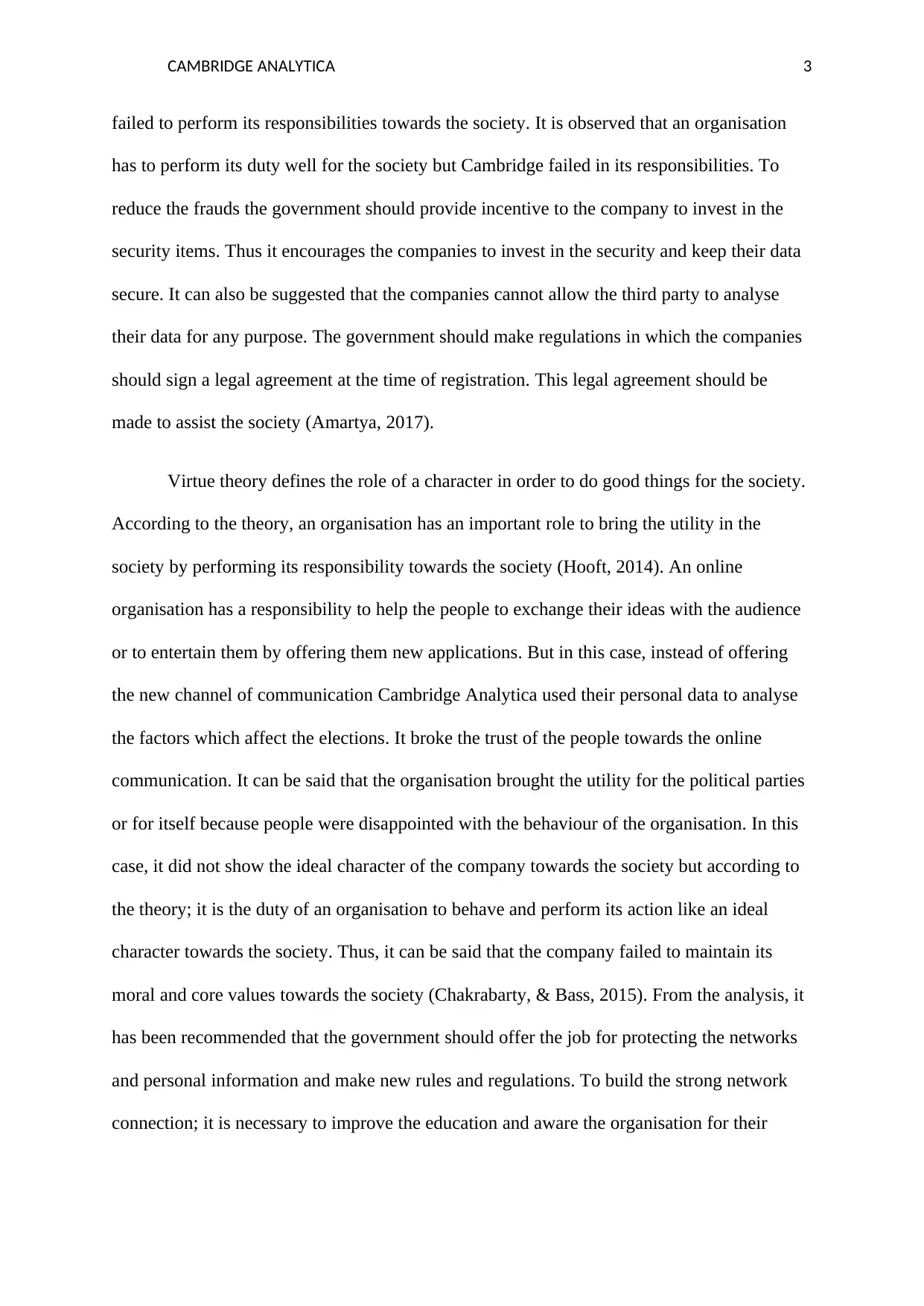
CAMBRIDGE ANALYTICA 3
failed to perform its responsibilities towards the society. It is observed that an organisation
has to perform its duty well for the society but Cambridge failed in its responsibilities. To
reduce the frauds the government should provide incentive to the company to invest in the
security items. Thus it encourages the companies to invest in the security and keep their data
secure. It can also be suggested that the companies cannot allow the third party to analyse
their data for any purpose. The government should make regulations in which the companies
should sign a legal agreement at the time of registration. This legal agreement should be
made to assist the society (Amartya, 2017).
Virtue theory defines the role of a character in order to do good things for the society.
According to the theory, an organisation has an important role to bring the utility in the
society by performing its responsibility towards the society (Hooft, 2014). An online
organisation has a responsibility to help the people to exchange their ideas with the audience
or to entertain them by offering them new applications. But in this case, instead of offering
the new channel of communication Cambridge Analytica used their personal data to analyse
the factors which affect the elections. It broke the trust of the people towards the online
communication. It can be said that the organisation brought the utility for the political parties
or for itself because people were disappointed with the behaviour of the organisation. In this
case, it did not show the ideal character of the company towards the society but according to
the theory; it is the duty of an organisation to behave and perform its action like an ideal
character towards the society. Thus, it can be said that the company failed to maintain its
moral and core values towards the society (Chakrabarty, & Bass, 2015). From the analysis, it
has been recommended that the government should offer the job for protecting the networks
and personal information and make new rules and regulations. To build the strong network
connection; it is necessary to improve the education and aware the organisation for their
failed to perform its responsibilities towards the society. It is observed that an organisation
has to perform its duty well for the society but Cambridge failed in its responsibilities. To
reduce the frauds the government should provide incentive to the company to invest in the
security items. Thus it encourages the companies to invest in the security and keep their data
secure. It can also be suggested that the companies cannot allow the third party to analyse
their data for any purpose. The government should make regulations in which the companies
should sign a legal agreement at the time of registration. This legal agreement should be
made to assist the society (Amartya, 2017).
Virtue theory defines the role of a character in order to do good things for the society.
According to the theory, an organisation has an important role to bring the utility in the
society by performing its responsibility towards the society (Hooft, 2014). An online
organisation has a responsibility to help the people to exchange their ideas with the audience
or to entertain them by offering them new applications. But in this case, instead of offering
the new channel of communication Cambridge Analytica used their personal data to analyse
the factors which affect the elections. It broke the trust of the people towards the online
communication. It can be said that the organisation brought the utility for the political parties
or for itself because people were disappointed with the behaviour of the organisation. In this
case, it did not show the ideal character of the company towards the society but according to
the theory; it is the duty of an organisation to behave and perform its action like an ideal
character towards the society. Thus, it can be said that the company failed to maintain its
moral and core values towards the society (Chakrabarty, & Bass, 2015). From the analysis, it
has been recommended that the government should offer the job for protecting the networks
and personal information and make new rules and regulations. To build the strong network
connection; it is necessary to improve the education and aware the organisation for their
Paraphrase This Document
Need a fresh take? Get an instant paraphrase of this document with our AI Paraphraser
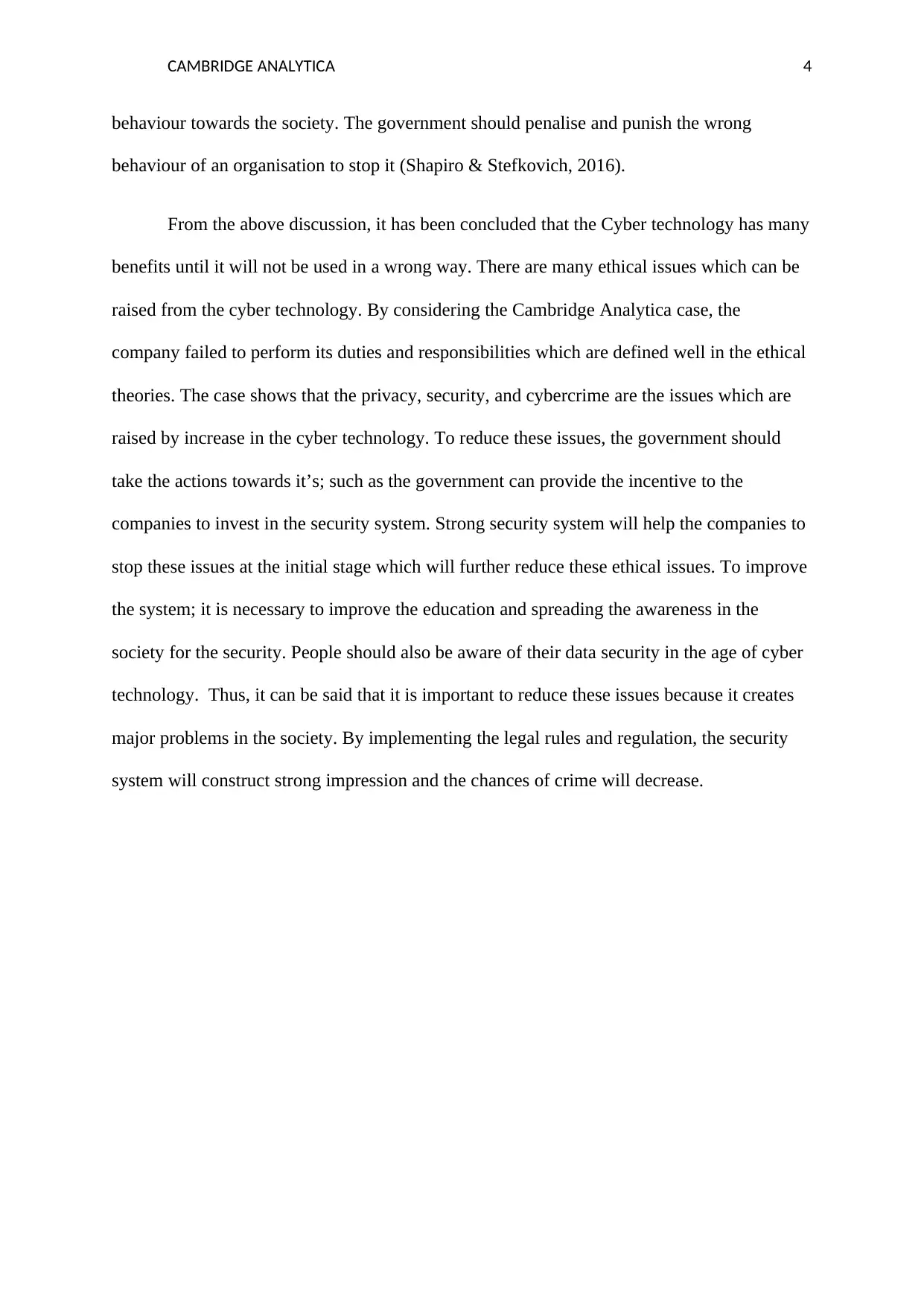
CAMBRIDGE ANALYTICA 4
behaviour towards the society. The government should penalise and punish the wrong
behaviour of an organisation to stop it (Shapiro & Stefkovich, 2016).
From the above discussion, it has been concluded that the Cyber technology has many
benefits until it will not be used in a wrong way. There are many ethical issues which can be
raised from the cyber technology. By considering the Cambridge Analytica case, the
company failed to perform its duties and responsibilities which are defined well in the ethical
theories. The case shows that the privacy, security, and cybercrime are the issues which are
raised by increase in the cyber technology. To reduce these issues, the government should
take the actions towards it’s; such as the government can provide the incentive to the
companies to invest in the security system. Strong security system will help the companies to
stop these issues at the initial stage which will further reduce these ethical issues. To improve
the system; it is necessary to improve the education and spreading the awareness in the
society for the security. People should also be aware of their data security in the age of cyber
technology. Thus, it can be said that it is important to reduce these issues because it creates
major problems in the society. By implementing the legal rules and regulation, the security
system will construct strong impression and the chances of crime will decrease.
behaviour towards the society. The government should penalise and punish the wrong
behaviour of an organisation to stop it (Shapiro & Stefkovich, 2016).
From the above discussion, it has been concluded that the Cyber technology has many
benefits until it will not be used in a wrong way. There are many ethical issues which can be
raised from the cyber technology. By considering the Cambridge Analytica case, the
company failed to perform its duties and responsibilities which are defined well in the ethical
theories. The case shows that the privacy, security, and cybercrime are the issues which are
raised by increase in the cyber technology. To reduce these issues, the government should
take the actions towards it’s; such as the government can provide the incentive to the
companies to invest in the security system. Strong security system will help the companies to
stop these issues at the initial stage which will further reduce these ethical issues. To improve
the system; it is necessary to improve the education and spreading the awareness in the
society for the security. People should also be aware of their data security in the age of cyber
technology. Thus, it can be said that it is important to reduce these issues because it creates
major problems in the society. By implementing the legal rules and regulation, the security
system will construct strong impression and the chances of crime will decrease.
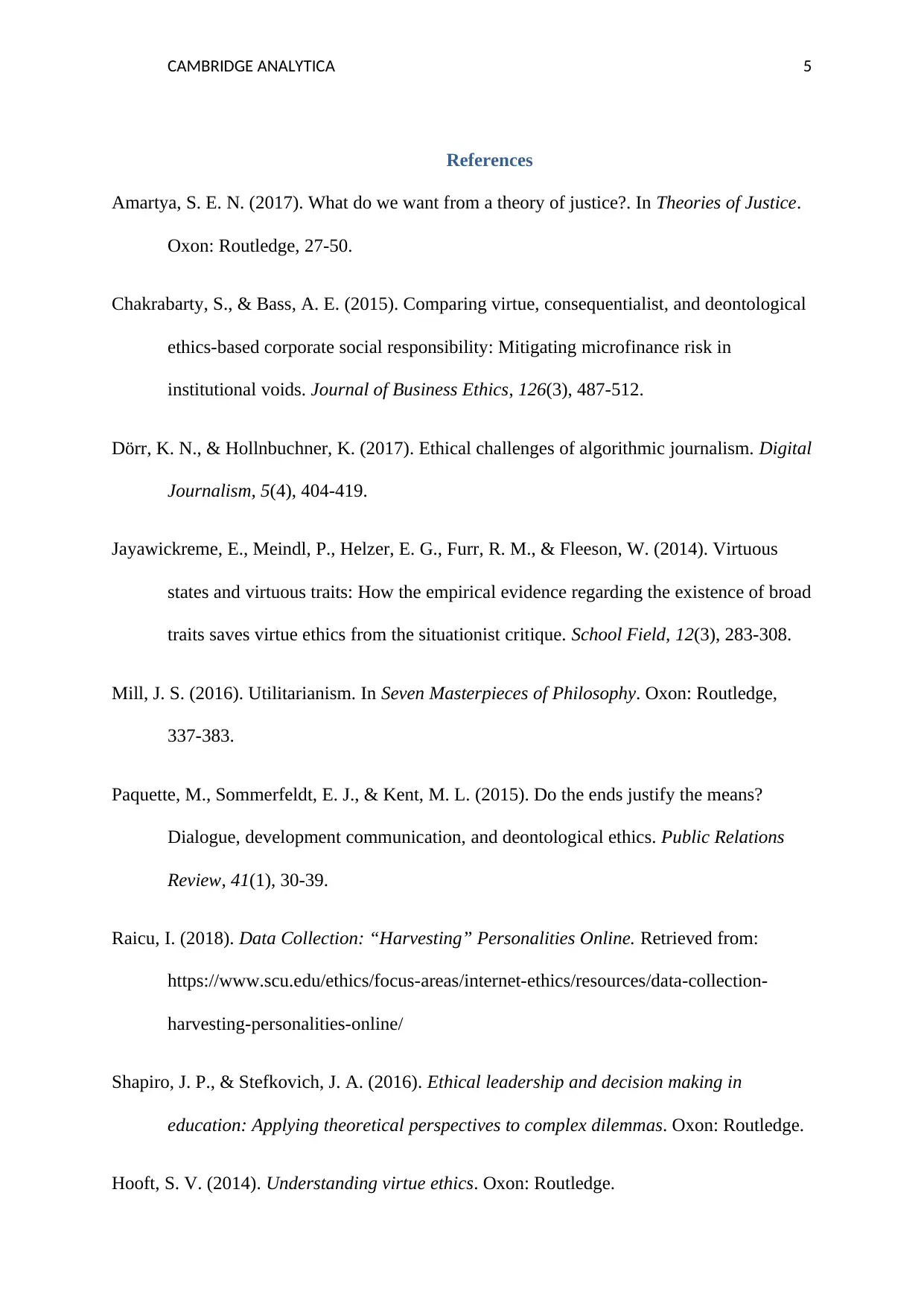
CAMBRIDGE ANALYTICA 5
References
Amartya, S. E. N. (2017). What do we want from a theory of justice?. In Theories of Justice.
Oxon: Routledge, 27-50.
Chakrabarty, S., & Bass, A. E. (2015). Comparing virtue, consequentialist, and deontological
ethics-based corporate social responsibility: Mitigating microfinance risk in
institutional voids. Journal of Business Ethics, 126(3), 487-512.
Dörr, K. N., & Hollnbuchner, K. (2017). Ethical challenges of algorithmic journalism. Digital
Journalism, 5(4), 404-419.
Jayawickreme, E., Meindl, P., Helzer, E. G., Furr, R. M., & Fleeson, W. (2014). Virtuous
states and virtuous traits: How the empirical evidence regarding the existence of broad
traits saves virtue ethics from the situationist critique. School Field, 12(3), 283-308.
Mill, J. S. (2016). Utilitarianism. In Seven Masterpieces of Philosophy. Oxon: Routledge,
337-383.
Paquette, M., Sommerfeldt, E. J., & Kent, M. L. (2015). Do the ends justify the means?
Dialogue, development communication, and deontological ethics. Public Relations
Review, 41(1), 30-39.
Raicu, I. (2018). Data Collection: “Harvesting” Personalities Online. Retrieved from:
https://www.scu.edu/ethics/focus-areas/internet-ethics/resources/data-collection-
harvesting-personalities-online/
Shapiro, J. P., & Stefkovich, J. A. (2016). Ethical leadership and decision making in
education: Applying theoretical perspectives to complex dilemmas. Oxon: Routledge.
Hooft, S. V. (2014). Understanding virtue ethics. Oxon: Routledge.
References
Amartya, S. E. N. (2017). What do we want from a theory of justice?. In Theories of Justice.
Oxon: Routledge, 27-50.
Chakrabarty, S., & Bass, A. E. (2015). Comparing virtue, consequentialist, and deontological
ethics-based corporate social responsibility: Mitigating microfinance risk in
institutional voids. Journal of Business Ethics, 126(3), 487-512.
Dörr, K. N., & Hollnbuchner, K. (2017). Ethical challenges of algorithmic journalism. Digital
Journalism, 5(4), 404-419.
Jayawickreme, E., Meindl, P., Helzer, E. G., Furr, R. M., & Fleeson, W. (2014). Virtuous
states and virtuous traits: How the empirical evidence regarding the existence of broad
traits saves virtue ethics from the situationist critique. School Field, 12(3), 283-308.
Mill, J. S. (2016). Utilitarianism. In Seven Masterpieces of Philosophy. Oxon: Routledge,
337-383.
Paquette, M., Sommerfeldt, E. J., & Kent, M. L. (2015). Do the ends justify the means?
Dialogue, development communication, and deontological ethics. Public Relations
Review, 41(1), 30-39.
Raicu, I. (2018). Data Collection: “Harvesting” Personalities Online. Retrieved from:
https://www.scu.edu/ethics/focus-areas/internet-ethics/resources/data-collection-
harvesting-personalities-online/
Shapiro, J. P., & Stefkovich, J. A. (2016). Ethical leadership and decision making in
education: Applying theoretical perspectives to complex dilemmas. Oxon: Routledge.
Hooft, S. V. (2014). Understanding virtue ethics. Oxon: Routledge.
⊘ This is a preview!⊘
Do you want full access?
Subscribe today to unlock all pages.

Trusted by 1+ million students worldwide
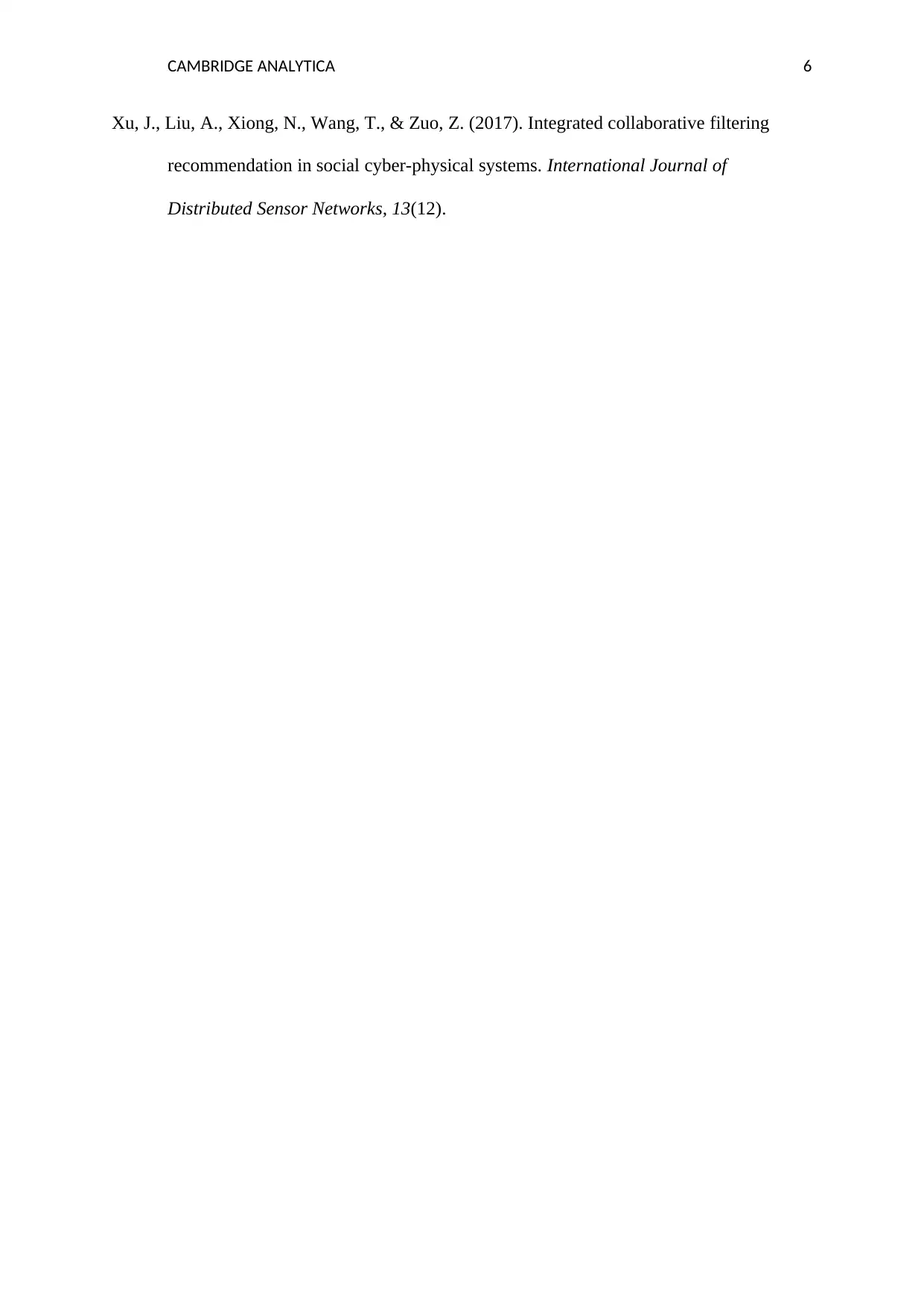
CAMBRIDGE ANALYTICA 6
Xu, J., Liu, A., Xiong, N., Wang, T., & Zuo, Z. (2017). Integrated collaborative filtering
recommendation in social cyber-physical systems. International Journal of
Distributed Sensor Networks, 13(12).
Xu, J., Liu, A., Xiong, N., Wang, T., & Zuo, Z. (2017). Integrated collaborative filtering
recommendation in social cyber-physical systems. International Journal of
Distributed Sensor Networks, 13(12).
1 out of 7
Related Documents
Your All-in-One AI-Powered Toolkit for Academic Success.
+13062052269
info@desklib.com
Available 24*7 on WhatsApp / Email
![[object Object]](/_next/static/media/star-bottom.7253800d.svg)
Unlock your academic potential
Copyright © 2020–2026 A2Z Services. All Rights Reserved. Developed and managed by ZUCOL.





